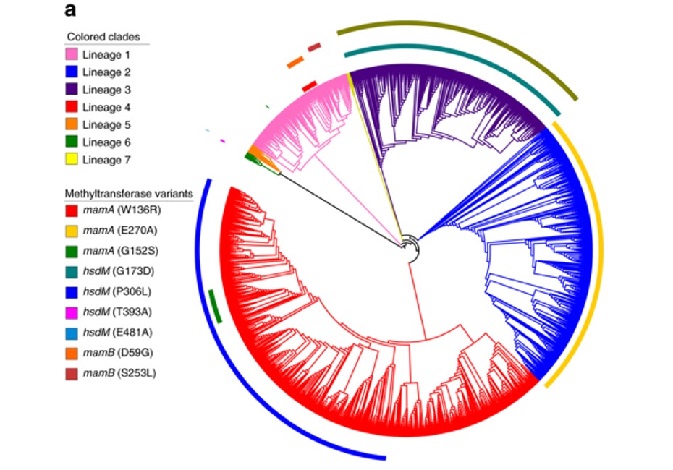Users
Social media
- More details here...
- Address
Parc Científic de la Universitat de València C/
Catedrático Agustín Escardino, 9
46980 Paterna (Valencia) Spain - Email:
iu.i2sysbio@uv.es - Phone:
(+34) 963544810
- Address
Links
They investigate a key mechanism in the evolution of human tuberculosis

Investigation
They investigate a key mechanism in the evolution of human tuberculosis

Research staff from the Institute of Integrative Systems Biology (I2SysBio), a joint center of the CSIC and the University of Valencia; from the Institute of Biomedicine of Valencia (IBV) and the Foundation for the Promotion of Health and Biomedical Research (FISABIO), among others, has studied the effect that mutations have on different strains of tuberculosis. The results, published in the journal Nature Communications, expand knowledge about the evolution of the bacteria that cause this disease in humans.
Tuberculosis is an infectious disease caused by the bacteria Mycobacterium tuberculosis, which causes devastating mortality in humans and animals, and which also entails significant economic losses. Knowing how the different bacterial lineages differ increases the understanding of the origins of the bacteria that cause the disease and the genetic mechanisms involved.
Álvaro Chiner Oms, researcher at the Joint Infection and Public Health Unit (Institute of Integrative Systems Biology, FISABIO-CSISP) and the IBV, highlights that “we have carried out an exhaustive comparison of transcriptomes and DNA-methylomes of nineteen representative isolated strains. of the global phylogenetic spectrum of human-adapted MTBC strains that has allowed us to discover unique transcriptional profiles.”
Iñaki Comas, also a CSIC researcher at the IBV, explains that in non-recombinant bacteria, where mutation provides most of the genetic variation, “selective and non-selective processes can have a great impact on functional diversification. Some of these functional differences can be translated into phenotypic characteristics. TheMycobacterium complex. tuberculosisor MTBC, which comprises a group of mycobacteria that affect humans and some species of mammals, despite its extremely low diversity, shows important biological differences between strains and phylogenetic lineages.”
In addition, the expert indicates: “we have observed that the differential transcription patterns between lineages reflected the constitutive expression of genes that are normally associated with the virulence of the bacteria. Isolated from the opportunity to generate diversity through horizontal gene transfer, transcriptional adaptation may allow MTBC isolates to optimize their infectivity and transmission in subtly different environments provided by different human host populations." In this sense, Comas concludes: "our study demonstrates that variation in MTBC transcriptional profiles is mainly due to mutations in the transcription start point and has probably evolved due to differences in host characteristics."
This discovery could improve the knowledge of how the different strains of tuberculosis have adapted to human populations to be transmitted successfully to the present day.
Article:
Álvaro Chiner-Oms, Michael Berney, Christine Boinett, Fernando González-Candelas, Douglas Young, Sebastien Gagneux, William R. Jacobs Jr., Julian Parkhill, Teresa Cortes and Iñaki Comas. «Genome-wide mutational biases fuel transcriptional diversity in the Mycobacterium tuberculosis complex». Nature Communications. DOI: https://doi.org/10.1038/s41467-019-11948-6


